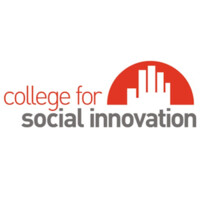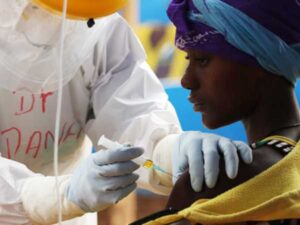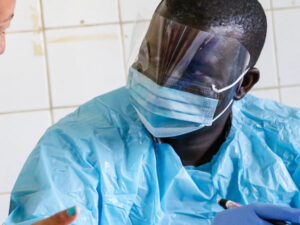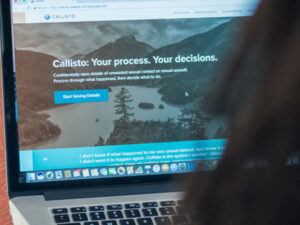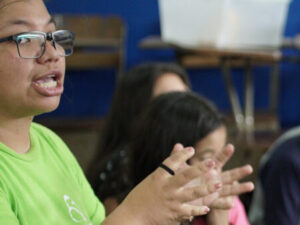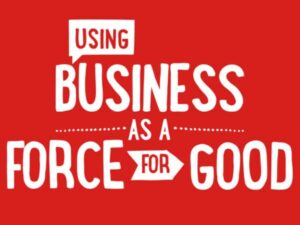The College for Social Innovation runs programs for college students to receive immersive, hands-on learning experiences focused on social innovation. Their flagship Semester in the City program brings students to Boston for a semester to intern at 100+ leading social impact organizations in the area.
Eric Schwarz of College for Social Innovation spoke with Ambika Samarthya-Howard on November 3, 2023. Click here to read the full conversation with insights highlighted.
Ambika Samarthya-Howard: To start, if you could please introduce yourself, your name, your organization, and what you do?
Eric Schwarz: I’m Eric Schwarz. I’m the co-founder and CEO of College for Social Innovation. We work with college students to give them immersive experiential learning opportunities for credit while in college. Turning what’s usually extracurricular learning into curricular learning. Our goals are to help build the next generation of problem-solvers, while pushing higher education to be more experiential, better and cheaper.
Ambika Samarthya-Howard: Are you a direct service organization where you go into the colleges and you train them? What is your approach?
Eric Schwarz: Yes, it’s direct service, with a long-term goal of systemic change. Its scale is initially at a small level, with an idea to spread over time. Our flagship program is called Semester in the City. Students come to Boston and we place them at one of 200 social impact organizations that we’ve worked with. It’s a little bit like studying abroad, but instead of going to Barcelona, they come to Boston. Instead of taking classes, they do a 400-hour internship, with some reflection, based on top of that. They get a full 16 credits for the experience.
Ambika Samarthya-Howard: How long do they do that for, and how do you source your students?
Eric Schwarz: They do it for a whole semester, around four months. We have 17 college partners, including the University of Massachusetts, Colby College, a set of liberal arts colleges, and public universities. We reach out to them and ask them to allow their students to do this program for full academic credit. Sometimes it counts towards a major, sometimes it’s just elective credits. In either case, it’s transformative for the students.
Ambika Samarthya-Howard: Can you give me an example of a student or a part of the program, and how you’ve seen impact or change?
Eric Schwarz: We had a student from University of New Hampshire (UNH) who developed a 200-page binder to help Pine Street Inn think differently. Pine Street Inn is New England’s largest homeless shelter and helps [individuals experiencing homelessness] think differently about transitioning from life in a homeless shelter in Boston to transitional housing. This student from UNH developed this 200-page binder, looking across 30 different cities and towns outside of Boston, at what were the transitional housing options. That became part of the playbook for Pine Street Inn.
We had a young woman, actually also from UNH, who came and worked with the Immigrant Family Services Initiative (IFSI); they work with a lot of Haitian immigrants in Boston. This woman was able to develop a playbook to help those immigrants get on public benefit healthcare in Massachusetts. There was a whole PowerPoint, a whole training, and it helped IFSI serve hundreds of Haitian immigrants.
Ambika Samarthya-Howard: Are most of the students from a business or a design background?
Eric Schwarz: More like liberal arts, usually. There’s a lot of psychology and sociology. The liberal arts are, you could say, under attack in the US, or under questioning, at least. People are saying, “How do you get a liberal arts degree and a job?” I think we’ve been kind of a partner for liberal arts institutions, saying you should be able to do both. Liberal arts do teach critical thinking skills in a way that, for business, for social impact, are really important. It’s also true that students should be developing more of a sense of how to apply those skills in a real world setting. Classroom learning doesn’t promote that. So, we do have some business students. We have a smaller number of engineering or STEM students. I’d say the biggest numbers are the more traditional liberal arts, social sciences.
Ambika Samarthya-Howard: How do you judge if you’re being successful? Is it primarily by the number of partners you have, or the number of students you’ve fitted?
Eric Schwarz: No. It’s good to grow that, and we do have a net promoter score that people register on whether it was a good experience, would they recommend it to a friend. But unlike higher education, sadly, we have some really good measurements for learning. I think generally, higher ed charges money. You pay tuition. You hope that you get a job afterwards, and you hope you have a good experience. There’s not actually any measurement of, are you learning things along the way? We have a set of 24 competencies that students rate themselves on at the beginning of the program, and at the end of a program.
Ambika Samarthya-Howard: Can you tell me a few of them?
Eric Schwarz: Ability to manage a project. Ability to learn from feedback. Ability to give feedback. Skill at working on a diverse team. Those are some. We push hard and we ask students, “Do you think you’re getting better at these things?” They tell us they are. It’s self-reported. Every student has a mentor, who is, for example, a supervisor for the Pine Street Inn, or IFSI. We also ask the mentors, “How would you rate these students on 20 competencies?” We have that kind of measurement, as well, and that’s positive.
Ambika Samarthya-Howard: Have you ever shared that out with higher education resources? I feel like a lot of business schools and a lot of internships, or other places, could really learn from those indicators.
Eric Schwarz: Yes. We’re getting to the point where it’s a big enough end size. We’ve had about 600 students do the program. We’re trying to find a way to not share it out in a blaming way, like, “Ha ha. We have this and you don’t,” to higher ed. Instead, share it in a more positive, solution-oriented way. “We’re doing this because you’re partnering with us, and you’re allowing these students to have this experience. So, we’re doing this together.” We’re doing a big project with the University of Vermont (UVM) right now, where they’re really embracing the impact, and they’re looking to study it more deeply against the comparison of UVM.
Ambika Samarthya-Howard: Can you tell me something you tried that didn’t work?
Eric Schwarz: We haven’t tried this, but something we haven’t done is the summer program. Everyone was like, “You should do a summer program. Do a summer program.” We’ve decided not to, in part, because getting credit and getting financial aid for summer programs is much harder.
The biggest challenge has been, growth has not been as fast as we expected. Not because we can’t get colleges to approve this for credit towards graduation, but because we’ve had a harder time than expected getting department heads to approve it as credit for a major.
In the United States, students need 120 or 128 credits to graduate. If they have two majors and a minor, almost all their credits have to be in one of those two majors or the minor. People who run the psychology department or the business department have this way of saying, “Oh, sure. That sounds nice, but it doesn’t count for our program.” That’s been a bigger challenge to figure out how to overcome.
Ambika Samarthya-Howard: In terms of any lessons that you’ve learned, are there any that you could share with other people that they could learn from?
Eric Schwarz: I think one that I’m excited about recently is like from the movie, Field of Dreams, “If you build it, they will come.” We’re now seven years under our belt with programming and we’re starting to get to the point where people are approaching us. We had an HBCU [Historically Black Colleges and Universities] in Delaware, Delaware State, saying, “We’re intrigued with what you’re doing. We’re going to raise some money to get some of our students to do it.” That’s great. We had a philanthropist in Taiwan, half a world away, ask, “Would you take some students from National Taiwan University?” We’re starting to get some people around the world, around the country saying, “This is exciting what you’re doing.” The lesson to me is, stick with it, because that didn’t happen in year one, year three, year five, but it’s starting to happen in year eight.
The other lesson that came out of COVID is, even experiential learning can be done in a hybrid environment. We had a couple semesters where all the internships were remote. We were a little smaller than we had been because of that. But students had a great experience. They were with their mentor on Zoom.
Ambika Samarthya-Howard: Wow. I would’ve never expected that.
Eric Schwarz: Their bubble was with other students, as opposed to with their parents. Our students all live in apartments in Austin, a neighborhood in Boston. It’s better to be in person, and we’re now back to the internships being, at least half if not all the days, in person. But it worked better than I would’ve thought, when it was fully remote.
Ambika Samarthya-Howard: So, your students live together, even though they work at different organizations?
Eric Schwarz: Correct.
Ambika Samarthya-Howard: You mentioned earlier that you see yourself as now doing a lot of systems change work. How would you describe that? And who are the actors involved?
Eric Schwarz: I spent most of my career in K through 12 education. I got to the school network through Citizen Schools, which I started, which was a network of after school and expanded learning programs for middle school students. So, I know K-12 better, I’m relatively new to higher education. Higher education has more problems. Change is slower, it’s set up to be very hard to change. We’re spending more money per student by a lot, to deliver less certain outcomes, in less learning time.
To the question around system change, one of the issues is accreditation. Every college needs to get re-accredited. One of the levers in terms of who could be part of the system for driving change, is the accreditors. If we could get the New England Group, or the different regional accreditors, if we could get them to say, “Hey, it’s part of getting re-accredited every five years. You have to share how many of your students are doing high impact learning. Are your underrepresented students getting access to this kind of experiential learning, or just your privileged students?” That would be one.
The other is, under Obama, there were all these innovation funds in education. I think we need that in higher education. I’d love to work with state level, or more likely the federal level, to get $50 million or a $100 million into an innovation fund, where colleges and partners would say, “Hey, give us $5 million, $10 million, to do an experiment around more experiential learning,” and just let a thousand flowers bloom. Get some evidence behind different models, and go from there.
Ambika Samarthya-Howard: You’ve hinted at this a little bit, about how scale is not necessarily the only thing. Where do you see your work going in the next five years, if it’s not just scaling more and more?
Eric Schwarz: We just started a program called Semester for Impact. A Semester in the City is the flagship in Boston. Semester for Impact allows students to get their credit doing an internship in their home college community. If they go to the University of Vermont, they stay in Burlington, they do an internship in Burlington, instead of coming to Boston. Then the support classes are one week in Boston in the beginning, where they come together, and then online, and some, just the Burlington cohort gets together on Friday mornings. I think that’s got a lot of potential.
I took a lot of lessons, a lot of wisdom from Jeff Bradach, from The Bridgespan Group, who wrote this paper on scale and spread, in which he argued that if you look over the last 30 years, even the most successful US social enterprises like Teach for America, Europe, some others, got to maybe a quarter or half of 1% of the problem they’re working on, even with incredible government support, private sector support, very talented leadership. We have to be humble about the limits of scale. We need to think more, it’s not like the private sector. It’s not like the computer chip industry, or the search engine industry. The task of human service organizations is very different. If the most we’re going to possibly get to is a quarter of a percent or half a percent, or one percent, we really need to be thinking about spreading through the ecosystem, through developing best practices, through building a movement.
I want to scale a little bit more. But basically, just enough to have a platform to influence the ecosystem. I think that is going to come partly through policy, partly through white papers, partly through conferences, sharing best practices. Partly just like doing cool stuff, and having people notice it. Maybe in ways we may not even be able to track. Say, “Oh, we should do something sort of like that.” And some of them will do it better, and do it differently. That’s, I think, the way for a big impact.
Ambika Samarthya-Howard: Wow. That’s really interesting. Just to close off, if you have any other insights that you feel you’d like to share with the larger space specifically, and you can say this from your point of view, as a student educator, or your point of view as a social innovator as well.
Eric Schwarz: This program comes out of my own experience as a 19-year-old, when, after having gone to three high schools, kind of being an adolescent screw-up, going to less good colleges than my parents went to, and struggling through freshman year, and then getting an internship after freshman year, that changed my life. It was working on a political campaign out in Colorado. I ended up not just going for the summer, but staying through election day in November. Got another internship in this person’s White House C office. As I look back on those two internships, I learned five or 10 times more than all 32 of my classes in college.
And yet, I got those, because my father knew this US Senator, because they were able to pay for me to do this unpaid. It was no credit, no pay, but I could do it. That’s my own personal experience. That launched my career, it launched my life, it gave me a sense of purpose, and most people don’t have access to that. The biggest lesson is we need to find a way to make those life-changing, experiential learning opportunities common, not rare. College is, I think, the way to do that, because we now have a country where the majority of people go to college, for at least a couple of years, many for four years, or six years, or more. We need to find a way to bake into that experience, deep, immersive, experiential learning that gives you a sense of purpose, and the power to go forward.
Ambika Samarthya-Howard: Are there any insights you have from the process of making what you just said a reality, that you think is useful for other people also starting organizations, or running organizations? As the CEO and founder.
Eric Schwarz: I mean, any kind of organization for profit or nonprofit, I think if you’re founding something, it’s hard. It needs to respond, it needs to come out of either a pain point, or a joy point in your own life. It has to be connected back to something that’s deeply motivating for you. Then you need to start with pilots. We started with 14 students. Usually it’s a pilot of one, like the founder. Then it’s a small pilot. Then you kind of build from there. You need to have a sense of math. It’s amazing how many nonprofit leaders or unsuccessful social entrepreneurs don’t understand the basic math of revenue and expense, because you need personal experience and motivation. You need pilots to show and learn, and make it better. Then you need a three-to five-year plan, with a way to grow. Then you need a team, because it’s never, no one person, even if they’re really talented, can do anything alone.
I think one of the big problems in higher education is it’s all about problem identification and not about solution identification.
Ambika Samarthya-Howard: Don’t you feel like that’s true for everything in our societal narrative right now?
Eric Schwarz: You’re right. We’re probably moving that way in culture broadly, but I think most people aren’t going to college and I think part of the challenge is that higher ed is about deconstructing things, which is not all bad. There’s a lot of power systems that need to be deconstructed and they’ve done a lot of things wrong, so I get the impulse to tear things down, but I think it needs to be balanced. This is the whole idea of solutions journalism, and I think it’s an idea of my program. I want young people to actually roll up their sleeves and work on solutions and recognize that they can make progress and they can work with IFSI to get patient immigrants to get healthcare. Out of that they can do it at a bigger scale and they can apply those lessons to other problems and other situations.
Ambika Samarthya-Howard: Thank you so much for sharing your insights with me today.
Click here to read the full conversation with insights highlighted.
Ambika Samarthya-Howard (she/her) is the Solution Journalism Network’s Chief Innovation Officer: She leads on innovation and technology, leverages communication platforms for the network strategy and creates cool content. She has an MFA from Columbia’s Film School and has been creating, teaching and writing at the intersection of storytelling and social good for two decades. She has produced content for Current TV, UNICEF, Havas, Praekelt.org, UNICEF, UNFPA, Save the Children, FCDO, Global Integrity and Prism.
* This interview has been edited and condensed.
Find other social innovation organizations working with students.

